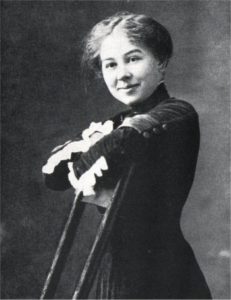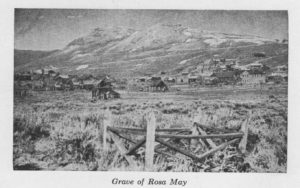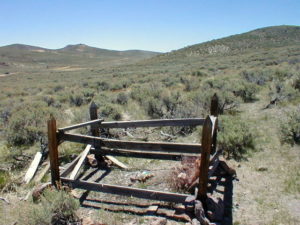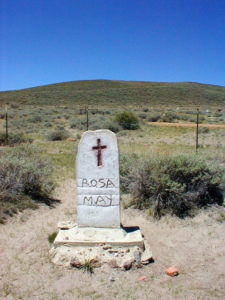I often tell people that most of my friends are dead, and this is what I mean…I love this woman. Don’t ask me why, except she was a good woman and had a wonderful life, but I have read everything I can about her and she has a place in my heart.
This chapter is excepted from “the Story of Bodie,” by Ella M. Cain…Rosa May was a prostitute in the town of Bodie, which is now a ghost town protected by the State of California…her story is charming, and I think it would be of interest to anyone interested in the life of the Old American West. Visit my photo gallery of the ghost town of Bodie, CA here
Story of Rosa May
Virgin Alley had a new sign, “The Highgrade.” It swung back and forth in the breeze over the latest house of ill repute on that long street inhabited by the demimonde of the camp.
The newly arrived occupant of the Highgrade was a dark-eyed, curly headed, petite French girl by the name of Rosa May. She had lived at 18 D Street in Virginia City, and later at No. 1 Ormsby Street in Carson City, Nevada. Then Bodie beckoned with its golden, and what turned out to be, its diamond-studded hand, and Rosa answered the call.
In a short time she became the idol and toast of all the men who frequented the sporting district of the town, and they were many.
One miner was heard to remark, ” She was a gal who had a smile you’d go to hell for, and never regret it.” Yes, Rosa was the undisputed queen of Bodie’s underworld !
It was most natural that Ernest Marks, owner and proprietor of the Laurel Palace Saloon, should fall head over heels in love with her. That was no surprise to anyone; but the surprise and disappointment was that Rosa seemed to have a “hankerin” after Ernest.
Ernest wasn’t bad looking. He was tall and dark, with a slight mustache, and, true to the Hebrew blood in his veins, had inherited the traditional trait of making money. He lavished plenty of it on Rosa, in diamonds and furs. He allowed the other girls from the Red Light to frequent his place at night, and dance to the tunes that the old fiddler played, but Rosa was never there. A shade of jealousy and rage would pass over his face if her name was mentioned lightly by any of his drinking customers. One evening a Cornishman named Billy Owens, who had come into some money on the death of his mother, called “Fire in the Head !” and the whole house rose up for a drink. “Make it champagne, Ernest,” he ordered; then, mounting a chair, with his glass raised in his hand, he shouted : “Here’s to Rosa May, the darlingest, sweetest little bunch of loveliness that ever came into this camp. She’s mine!” Ernest turned as white as a sheet, and, reaching down behind the bar. He grabbed the pistol that he had kept there for emergencies. He pointed it straight at, Billy, and coolly and deliberately said, “Don’t drink to that toast, Billy—or I’ll fill you full of lead. No other man but me can toast Rosa at this bar, or any other bar in this whole damn camp.” Billy was raising his glass to drink, when suddenly pistol shots sounded from behind him—and the lights went out, for some level headed customer knew Ernest meant what he said. From that time on bad blood was known to exist between Ernest and Billy.
Shortly afterwards Rosa took a trip abroad. She visited her native Paris, and flitted around Brussels and Berlin, and finally came to a standstill in Monte Carlo. Many thousands of dollars that had been lost by the miners over the round green tables of the Laurel Palace Saloon, in a Western Boom Town, were laid on the tables in the luxurious gambling halls of Monte Carlo.
Finally Rosa returned to Bodie; her coming being heralded in advance by ten or fifteen trunks, which were deposited on her porch in Virgin Alley. Yes, Rosa had come home with much finery and many jewels. She replaced the red lantern that hung on her porch with a fine hand wrought iron one with a red panel glass. She also brought silver door knobs, fine furniture and mirrors throughout the house.
During her absence the “Fortuna Ledge” had been discovered in the Standard Mine. It was almost pure gold, worth thousands of dollars a pound: ‘The miners, most of them, didn’t scruple about landing down in town with some of it sticking around in. their lunch buckets. The miner’s code seemed to ‘`Hadn’t the Lord put it in the ground, and didn’t it belong to anybody who found it ?” Rosa came by a fair share of the highgrade. The miners’ prettiest and most glistening samples were saved for her. She bought more and more diamonds from Frank Golden—the jeweler. One day she came to Frank Golden with some of the richest and most beautiful specimens she had. “Make me a pair of cuff links and a match box out of this highgrade, Frank,” she said. “Make the frames of the pure gold and face it with the quartz. On the back of the match box I want the initials E. M. engraved, and make it sentimental by engraving the touching little figure of a cupid underneath.” This was the proof the miners needed that she did love Ernest Marks.
In the due course of time Ernest was presented with these tokens of Rosa’s affection. He proudly displayed them on every slightest pretext. It was strange how many cigars he always had to light in the presence of customers, and how damn anxious he was to have someone tell Billy Owens about the gifts and where he got them.
A hard, cold winter soon held the camp in its icy grip ; deep snows, below zero temperatures, “pneumonia weather.” Rosa went from one miner’s cabin to another, nursing the men who were stricken. Many a letter she penned home—for the doomed miners—to loved ones. Many a time she closed tired eyes that would never open again. Then the day came when she found it impossible to go on her mission of mercy. She had contracted the dreaded pneumonia. In a few days she was dead. She was buried in the “Outcast Cemetery,” “Boot Hill”; and Ernest had a picket fence placed around her grave. “Some day,” he told himself, “Rosa would have a fitting monument,” but that day never came, although she left him a fortune in money and diamonds.
But the day did come when the Fortuna ledge faulted, dropped somewhere, was lost. The camp was on the decline ; so was the fortune of Ernest Marks. The “boom camp” became a “ghost town.” A few of the old inhabitants held on, and Billy Owens and Ernest Marks were two of them. Gradually the feud of other years was somewhat healed, but not forgotten. Occasionally they played cards together to pass. the time. On pleasant days they always sat outside on the bench in front of the empty, neglected gambling hall and saloon. Many times Ernest would take the gold match box from his vest pocket and light a cigar, always holding the side with E. M., and the touching cupid, so that Billy could see them. Then Billy would turn his head in the opposite direction, looking in a reminiscent way into space—and would not speak for several minutes.
Rosa’s fabulous jewels were being sold one by one by Ernest, all far below their real intrinsic value. Then the day came when there were no more to sell; but the match box and cuff links were still his, and a trunk full of Rosa’s finery and keepsakes, that he had treasured and loved all these years.
Finally Ernest fell ill. He had a lingering illness. Billy Owens was his constant companion and his nurse. Relatives in New York were informed of his condition and circumstances. They sent him regular remittances until he died. His last request, to be buried beside Rosa, was granted. Billy Owens himself dug the grave.
Billy was downhearted and lonely after Ernest died. He lived by himself in an old ramblin’ lodging house that belonged to his mother—”Grandma Johnston.” Only empty rooms surrounded him. Every door he locked tight, and he barricaded himself in one little room. One morning no smoke came from the chimney, and when a miner broke into Billy’s house he found him dead.
Billy was badly in debt. In order to pay his debts, and defray his funeral expenses, the Sheriff auctioned off his lodging house and all its contents. Among other things a trunk was brought out and sold—contents unseen. It contained the finery, pictures and letters of Rosa May. Behind a family picture, in a knothole in the wall, concealed by several layers of wall paper which were pasted over it, was found Billy’s valuables : three gold-plated watches, a horseshoe stickpin, a picture of his mother—in a locket, a few silver coins, and a solid gold match box and cuff links—faced with quartz, and initialed E. M. There was nothing much of value, except the match box and cuff links. The bidding was spirited on these, and brought in more than a hundred dollars. His day of triumph had arrived. The match box and cuff links buried Billy Owens.





Loved the story. I’m compiling a list of Bodieites for a possible book
I wouldn’t dare read and run. I’m reading George Williams III book on Rosa May right now and I find it awfully interesting. I’ve always been awfully intrigued with the “go west young man” saga and the old west. Thanks for posting this.
Very great reading of Miss May. I’ve been to Bodie, one of my best memories